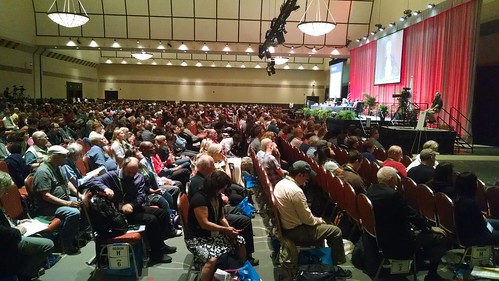Repeating History at the MTA Annual Meeting
It's always interesting to attend the MTA Annual Meeting. It's a perfect example of watching people who don't know the history undertaking to repeat it. Every year. I wonder if anyone has written a history of Annual Meeting. I'm skeptical that you could get people to read it, but we are talking about teachers: they might.
There are two truisms about annual meeting: (1) everyone has an opinion and (2) people quickly get tired of hearing other people's opinions. Trying to strike a balance between letting people talk and trying to move ahead with the business of the organization is an endless challenge. Every year, people try to tinker with the standing rules trying to adjust this balance. This year was the same.
For this to make any sense to anyone who hasn't attended Annual Meeting, a quick precis is probably necessary. Annual Meeting is conducted in a giant hall with 1000-2000 people seating in blocks by "region". In the front of the hall is a platform with a long table and a podium and three giant screens. There are 8 microphones and cameras set up among the participants. At each microphone is a box with large colored signs you can hold up. You hold up a different color to be recognized for different purposes: a yellow card, to ask a question; a green card, to speak in favor of a motion; and a red card, to speak against a motion. The standing rules define exactly when you can make a motion and what kinds of motions you can make with each color and which takes precedence. There is a parliamentarian and several staff members who scan the audience and pass cards to the president with which microphone is next in the speaking order.
Normally (I use this term advisedly), the maker of a motion can speak to a motion (on a green) and then the floor is opened to questions (yellow cards), and then people can debate the motion using green and red cards, but questions can still take precedence. Once all the questions have been answered and everyone has spoken, there is a vote on the question and the motion is adopted or rejected. As I say, "normally." But normally has nothing to do with it.
In point of fact, teachers are gifted at rhetoric and love to fill time with the sounds of their own voices. They love the challenge of using a "question" to actually speak for or against the motion. Or trying to block "the other side" by asking question after question to thwart debate. At the same time, the body, as a whole, tends to lose patience with people trying to gum up the works. These tactics lead people to make motions to "close debate". But you can only make a motion to close debate on a red or green card. And when there's a sea of yellow cards, red and green never get called. So they changed the standing rules a few years ago to allow you make a motion to "suspend the rules" (which requires a 2/3 vote) on a yellow card to change the order of precedence to allow green and red cards to be called. But often this happens after people are already so frustrated that someone will call the question and end debate before any actual debate has occurred.
OK. So this year, someone had the clever idea of requiring two green and two red cards before someone could make a motion to close debate. After much debate (and tempers already wearing thin), this change to the standing rules was adopted. And lasted for about two motions. Pretty quickly, people from the opposing side started holding up green cards and then not actually speaking in support of the motion, purely to thwart the rule. I called a point of order to ask whether these sham statements of support "counted" and was told that they did because to do otherwise would require the parliamentarian to ascribe intent. Shortly afterward, someone moved to suspend the rules to undo the new change in the standing rules.
This turned out to be convenient because the next day, as the temper of the body grew even shorter, we were anticipating that a group would try to offer amendments to tinker with the budget. So while the questions were still being asked, I stood with a green card and my colleague Dave took a red card and we waited (and waited and waited) until we could make a motion: and so I was first in the calling order and called to close debate. They tried to make a quorum call, which failed. And then my motion, and the budget, passed easily. Yay me.
What I'm not talking about, of course, are the underlying dynamics and tensions. I'll leave those for another post.

